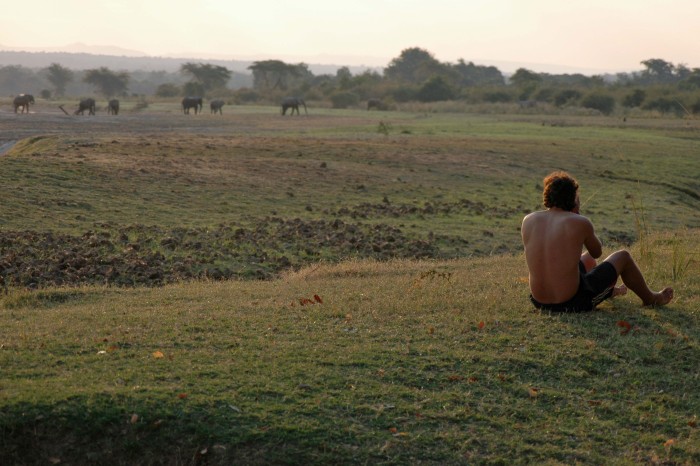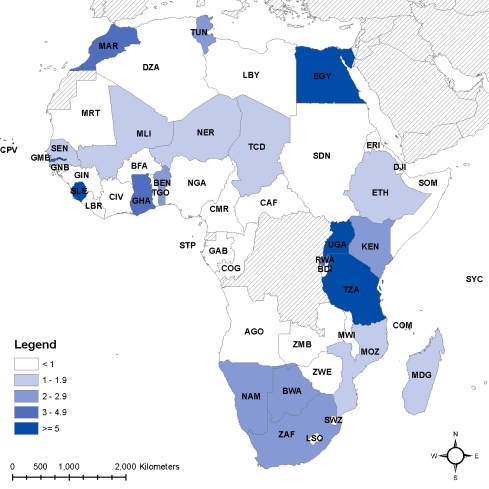Explaining African tourism

Elephants in Zambia: That's me snapping some photos in the South Luangwa National Park, one of the best (if not the best) game reserve I've visited. Photo by Isabel Lundin.
I was fortunate to share a platform last week with Deputy Minister of Tourism, Thokozana Xasa, and SAA CEO, Siza Mzimela on the topic of tourism in Africa at the Africa Dialogue conference. Moderator Thebe Ikalafeng (Chairman of Brand Africa) fired off the discussion by asking Ms. Mzimela why it is that SAA (again) requested R6 billion from the Treasury. Her response – that SAA would like to expand its activities in Africa which will require large capital investment, capital which will be sourced from the capital markets with the R6 billion used as collateral – was to the point and clear, a sign that SAA may be turning the tide.
I was asked several questions about some (provocative) statements in my research papers (i.e. that African tourists are similar to foreign tourists visiting Africa). With limited time to explain the context and methodology, I focused rather on what my results could add to the discussion. I had prepared a short introduction, though, and thought it good to repeat it here (with links to the appropriate papers).
Tourism research in South Africa is a relatively new field, although there are some strong schools (such as those at North-West University Potchefstroom campus) that is doing invaluable micro-economic research. I come from a trade background, and first became interested in tourism when I calculated South Africa’s revealed comparative advantage in various goods and service sectors. Travel service exports (mode 2 is tourism) was the only service sector that revealed a strong comparative advantage. I investigate the reasons for this persistent advantage over time in a paper published last year.
 I also calculated tourism RCAs for other African countries. I found that a number of African countries for which 2006 data is available reveal comparative advantages in tourism. Four interesting trends are observed: first, the island economies of Mauritius, Reunion, Seychelles, Cape Verde, etc all have, as expected, large RCAs. The three northern African countries of Egypt, Tunisia and Morocco also attract a lot of tourists relative to trade in other trade sectors, probably because of their proximity to Europe. Most interestingly, a band of countries running from South Africa to Ethiopia on the East coast of Africa all achieve relatively strong comparative advantages. (Zimbabwe should also be included here, but its political problems have eliminated its advantage – and data.) Finally, a group of countries in West Africa – especially those landlocked – also reveal (weak) comparative advantages in tourism.
I also calculated tourism RCAs for other African countries. I found that a number of African countries for which 2006 data is available reveal comparative advantages in tourism. Four interesting trends are observed: first, the island economies of Mauritius, Reunion, Seychelles, Cape Verde, etc all have, as expected, large RCAs. The three northern African countries of Egypt, Tunisia and Morocco also attract a lot of tourists relative to trade in other trade sectors, probably because of their proximity to Europe. Most interestingly, a band of countries running from South Africa to Ethiopia on the East coast of Africa all achieve relatively strong comparative advantages. (Zimbabwe should also be included here, but its political problems have eliminated its advantage – and data.) Finally, a group of countries in West Africa – especially those landlocked – also reveal (weak) comparative advantages in tourism.
Of course, the next step is to identify the causes of this advantage. The full results will soon be published in a co-authored article with Leon du Toit, but a Working Paper is available. I think there are four interesting findings. First, natural and cultural resources seem to matter a lot in explaining the advantage. We test this with a number of variables – the UNESCO World Heritage sites, size of protected area and length of coastline, to name a few. The coefficients are large and significant, suggesting that African countries should put greater value on their environmental and cultural resources. Second, some variables that we think might be important does not come out statistically significant. Crime is the most obvious example here; most reports on tourism emphasise the adverse affects of (perceived) crime on a country’s tourism industry. We interpret the insignificance in the following way: while crime will have an adverse effect on tourism, it probably also has adverse effects on other trade sectors. Thus, tourism is not disproportionately more affected by high crime than other sectors. Third, we show that something like a neighbourhood effect exists; countries, on average, have a higher RCA if their neighbours also have a high RCA. Political tension in a neighbouring country might thus affect a tourism industry in the stable country worse than other trade sectors. This also give rise to some policy suggestions: why not reduce the costs of moving between countries for tourists, like a UNIVISA for SADC countries as has been proposed before (and at the Africa Dialogue conference)? Finally, we find that relative transport costs (air over sea) matter. While air transport to African countries is expensive relative to Asia, it is less expensive than sea transport to Africa vis-a-vis Asia. Landlocked countries in Africa – as can be seen from the map – would do well to focus on the tourism industry, especially smaller countries like Lesotho and Swaziland. Rwanda and Uganda already have a strong comparative advantage. This final result also suggest at least two policy interventions: reduce the costs of air travel further (why not open air travel to chartered flights from Europe?), and relax policies that may hinder tourism developed, especially in the poorest landlocked countries. Having traveled to Lesotho (see below), I have seen the limited availability of good tourism infrastructure in that country. This is probably as a result of institutional constraints: the system of property rights, the difficulty of land acquisition for foreigners, and similar issues restrain the development of what might be a highly successful tourism industry, especially given its location within the borders of a country where tourism is already well-developed.
These are just some of the ideas of my first work in tourism. I have also compared within-African tourism with inbound-African tourism (see below and here), have investigated the impact of the World Cup on tourist arrivals (with Maria Santana-Gallego, see here and here), and estimated the impact of international students studying at Stellenbosch University (with Emile du Plessis, see here). Most recently, I’m busy with an exciting project that investigates the impact of historical migration on tourism. But more on this later.
Tourism is an exciting research area. It is also an important economic sector in the South African economy, accounting for a larger share of GDP than agriculture, for example. We thus need to expand our understanding of its causes and consequences, and hopefully arrive at policy suggestions that will allow the tourism industry, especially in small, landlocked African countries, to take off.
Hi Johan my name is benitasenaokityduah and am really impressed with the research you have done. I live in Ghana and will appreciate if can help with some ideas on how to make our country more attractive to tourists.
Benita Sena Okity-Duah
September 13, 2012 at 22:27
nice posting man,it is the first blog which i read that give complete info about africa tourism.keep it up ur writing.
rajasthan tour india
April 25, 2012 at 13:30
Once again very interesting to read about your research Johan! Greetings from Munich!
Max S.
April 16, 2012 at 07:47
Thanks Max. What are you busy with at the moment? Any plans to travel soon?
Johan Fourie
April 16, 2012 at 08:34